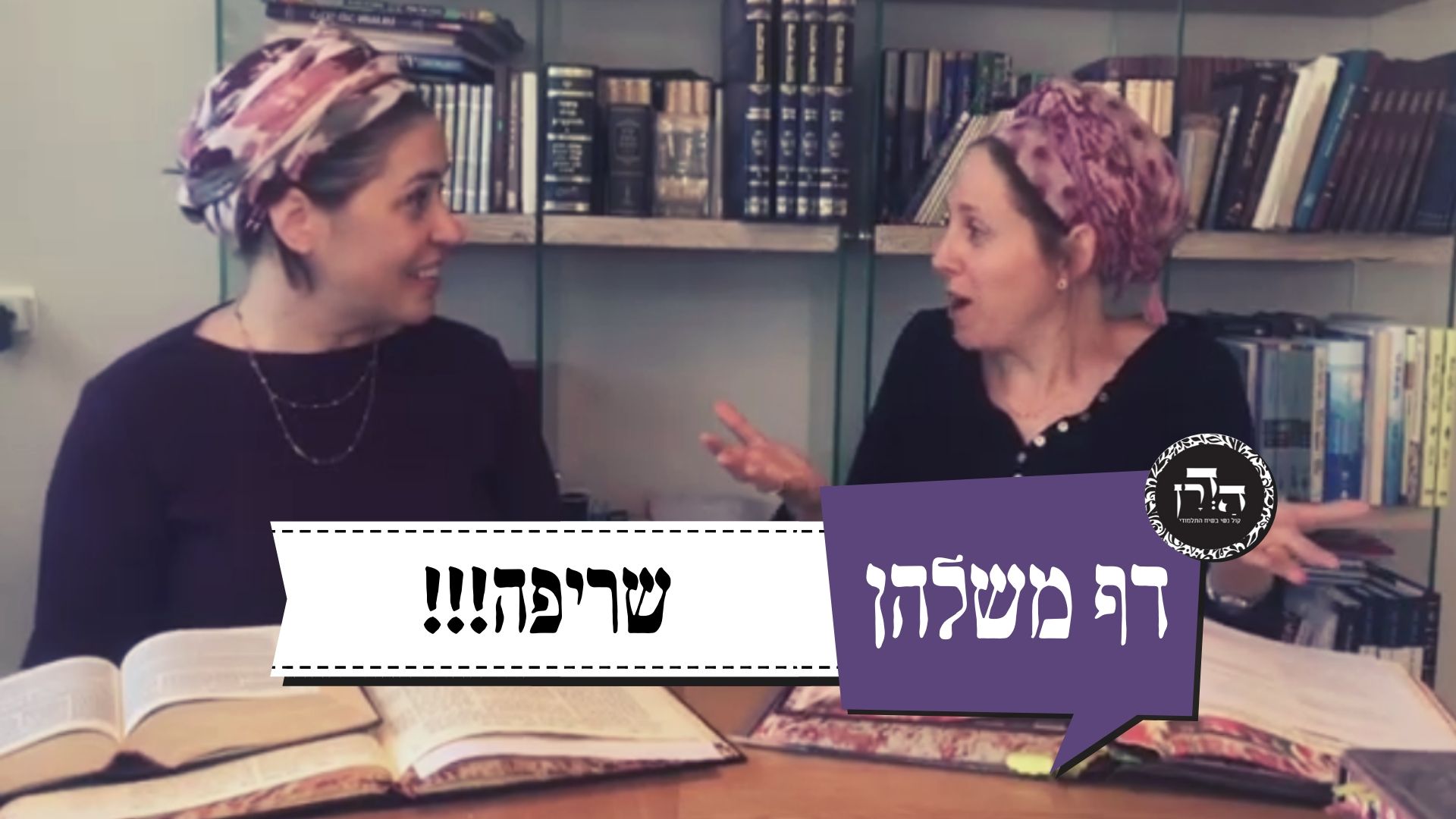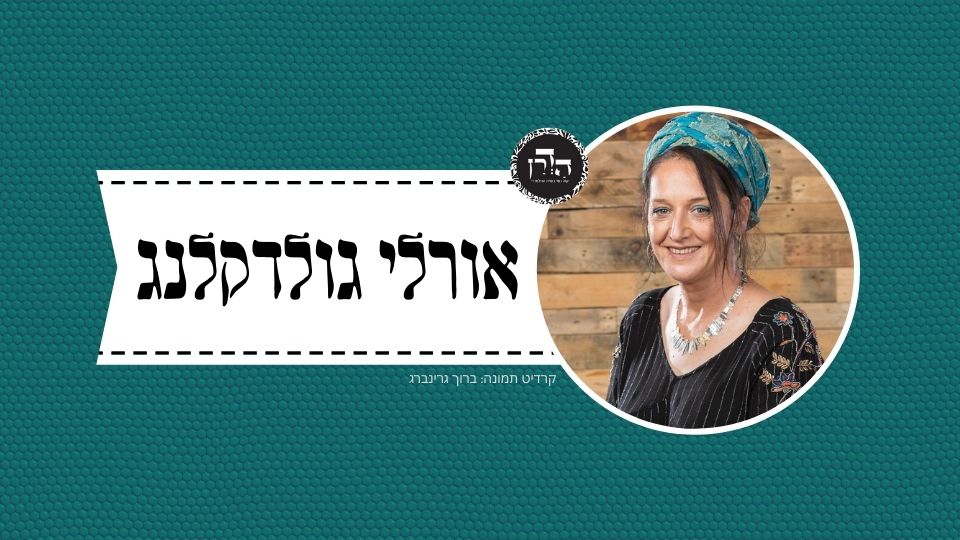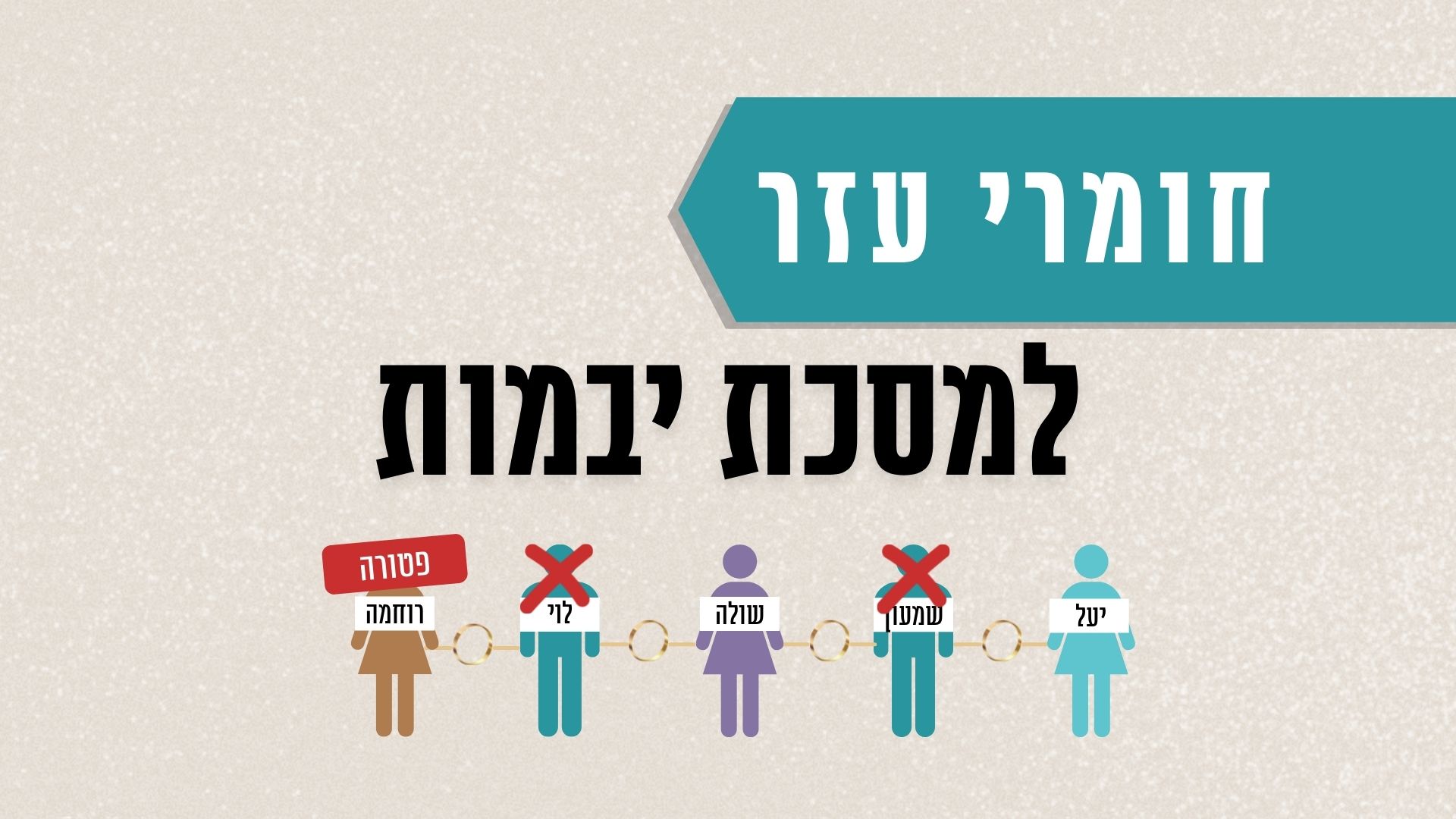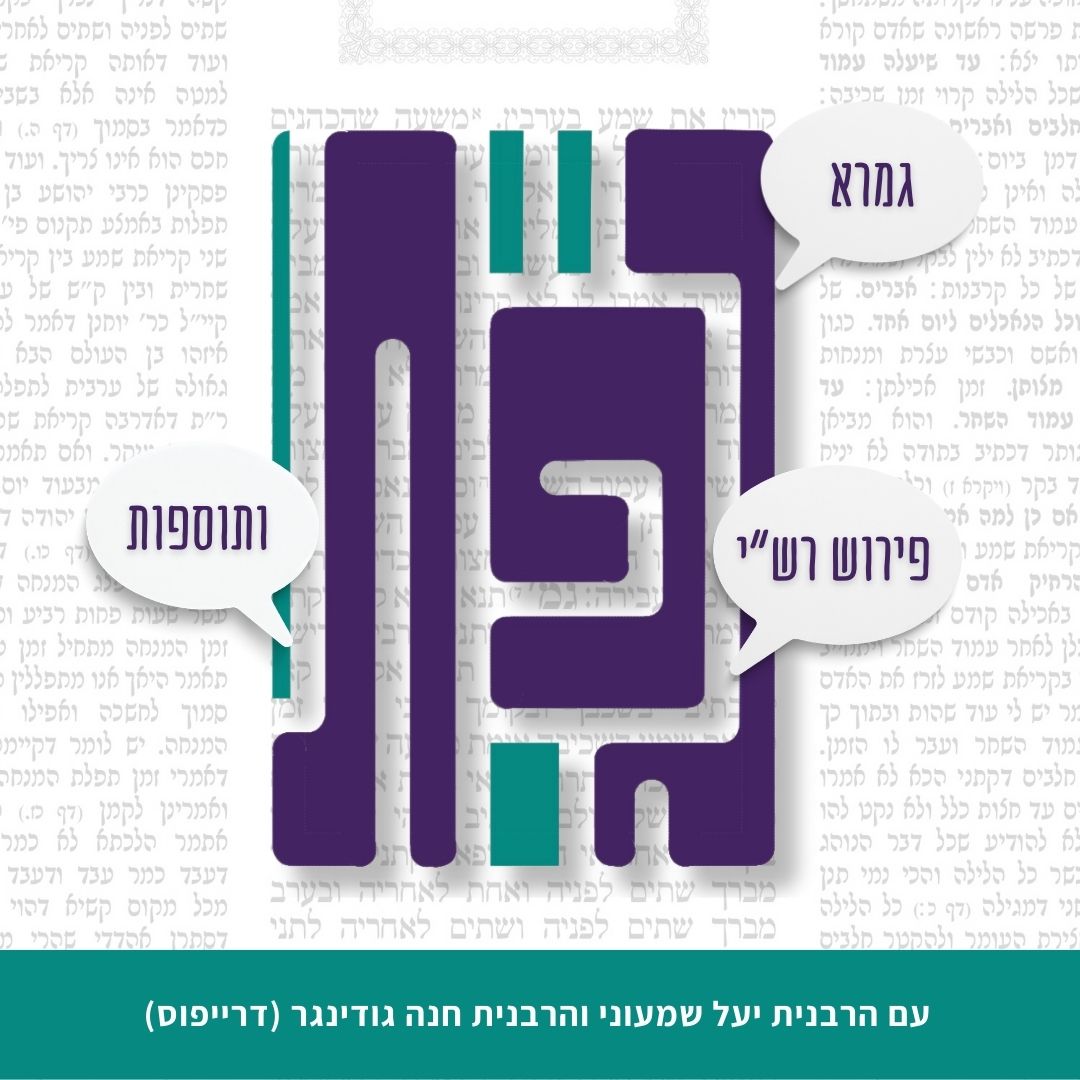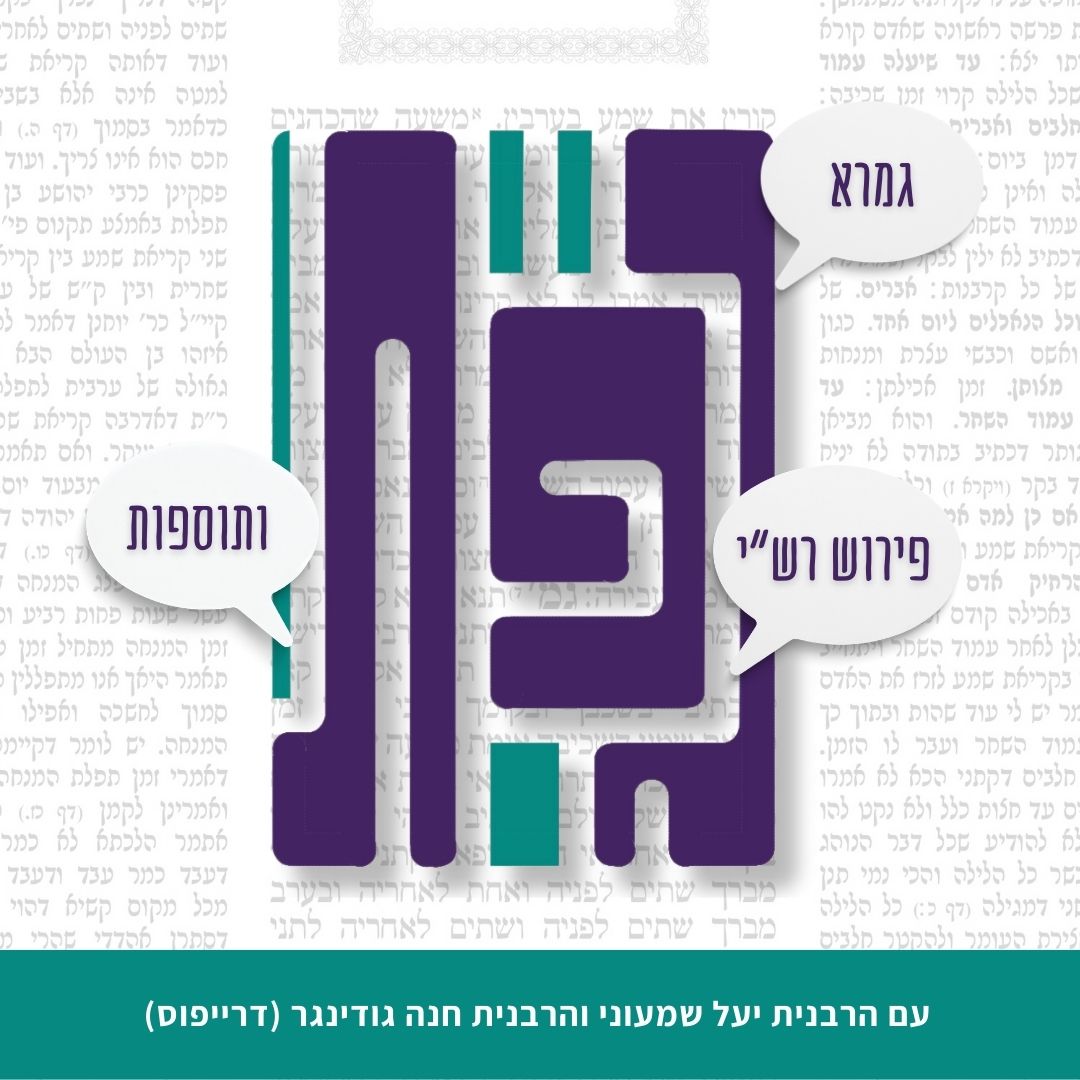האם המילה ציפור באמת רק מתייחסת לצפורים כשרים? למה יש פטור במקרה שרק האפרוחים טמאים? האם חייבים במצווה אם יש משהו חוצץ בין האם לאפרוחים? מה הדין אם הצפור מעופפת? מה הדין אם הציפור עומדת בין שני ענפים מעל לביצים?
הלימוד החודש מוקדש לרפואת פיליס הכט, גיטל פעשא בת מאשה רחל על ידי חברותיה הרבות שאוהבות ומעריכות אותה.
רוצה להקדיש שיעור?

כלים
הלימוד החודש מוקדש לרפואת פיליס הכט, גיטל פעשא בת מאשה רחל על ידי חברותיה הרבות שאוהבות ומעריכות אותה.
כלים
העמקה
רוצה להבין מה באמת קורה מתחת לפני השטח של הסוגיה?
שיעורים, פודקאסטים והרחבות של מיטב המורות שלנו יפתחו לך עוד זוויות וכיווני חשיבה.
חדשה בלימוד הגמרא?
זה הדף הראשון שלך? איזו התרגשות עצומה! יש לנו בדיוק את התכנים והכלים שיעזרו לך לעשות את הצעדים הראשונים ללמידה בקצב וברמה שלך, כך תוכלי להרגיש בנוח גם בתוך הסוגיות המורכבות ומאתגרות.
פסיפס הלומדות שלנו
גלי את קהילת הלומדות שלנו, מגוון נשים, רקעים וסיפורים. כולן חלק מתנועה ומסע מרגש ועוצמתי.
חולין קמ
(דניאל ד, ט) ובענפוהי ידורן צפרי שמיא צפרי שמיא איקרו צפרי סתמא לא איקרו
stated in the verse describing a tree: “And in its branches will dwell the birds [tzipparei] of the heaven” (Daniel 4:9). The verse states only: “The birds [tzipparei],” and not: The birds of any type of wing. Accordingly, the term “the birds [tzipparei]” must be referring to all birds, whether kosher or non-kosher, since all birds dwell in tree branches. The Gemara rejects this: Non-kosher birds are called: Birds [tzipparei] of the heaven, but they are not called: Tzipparei, in an unspecified manner.
ת”ש (דברים יד, יא) כל צפור טהורה מכלל דאיכא טמאה לא מכלל דאיכא אסורה
The Gemara suggests: Come and hear that which is stated in the passage discussing kosher and non-kosher animals: “Every kosher bird [tzippor] you may eat” (Deuteronomy 14:11). Since it was necessary for the verse to specify that it is referring to a kosher bird [tzippor], by inference, one may conclude that there is a non-kosher bird [tzippor], in contradiction to the statement of Rabbi Yitzḥak. The Gemara rejects this: No, this is not the correct inference. Rather, by inference one may conclude that there is a tzippor that is prohibited for consumption, despite its being a kosher bird.
מאי היא אי טרפה בהדיא כתיב ואי בשחוטה דמצורע מסיפא דקרא נפקא (דברים יד, יב) וזה אשר לא תאכלו מהם לרבות שחוטת מצורע
The Gemara asks: What is this kosher bird whose prohibition must be derived from this verse? If it is a bird with a wound that will cause it to die within twelve months [tereifa], that would be superfluous, as that is written explicitly in the verse: “An unslaughtered animal carcass, or a tereifa, he shall not eat” (Leviticus 22:8). And if it is referring to the slaughtered bird from the purification ritual of a leper, which is prohibited for consumption despite being kosher, that would also be superfluous, since it is derived from the latter clause of the verse in Deuteronomy, as the verse states: “But these are they of which you shall not eat” (Deuteronomy 14:12), which serves to include the slaughtered bird of the leper.
לעולם בשחוטה דמצורע ולעבור עליו בעשה ובלא תעשה ולוקמה בטרפה ולעבור עליו בעשה ולא תעשה דבר הלמד מענינו ובענינא דשחוטה כתיב
The Gemara responds: Actually, the verse: “Every kosher bird you may eat,” is referring to the slaughtered bird of a leper, and the verse indicates that one transgresses the positive mitzva of: “You may eat,” in addition to the prohibition of: “But these are they of which you shall not eat,” on account of it. The Gemara objects: But why not interpret the verse as referring to a tereifa, and explain that the verse teaches that one transgresses a positive mitzva and a prohibition on account of it? The Gemara responds: The verse should be interpreted as referring to the slaughtered bird of a leper, since it is a matter derived from its context, as that verse is written in the context of a slaughtered bird. By contrast, a tereifa is not properly slaughtered, and interpreting the verse in that manner does not fit the context.
ת”ש (ויקרא יד, ד) שתי צפרים חיות מאי חיות לאו שחיות בפיך מכלל דאיכא לאו שחיות בפיך לא מאי חיות שחיין ראשי אברים שלהן
The Gemara suggests: Come and hear that which is stated in the passage discussing the purification ritual of a leper: “Then shall the priest command to take for him that is to be cleansed two living birds [tzipporim] that are kosher” (Leviticus 14:4). Since the birds are obviously alive before the purification ritual begins, what is the meaning of the word “living”? Is it not that they are living in your mouth, i.e., permitted for consumption? If so, by inference, one may conclude that there are birds [tzipporim] that are not living in your mouth, i.e., that are not kosher. The Gemara rejects this: No, that is not its meaning. Rather, what is the meaning of the word “living”? It means that their extremities are living, i.e., attached to their bodies. The verse indicates that the kosher birds must have all their limbs attached to their bodies in order to be used in the purification ritual.
ת”ש מסיפא טהורות מכלל דאיכא טמאות לא מכלל דאיכא טרפות
The Gemara suggests: Come and hear a proof from the latter clause of that verse: “Two living birds [tzipporim] that are kosher.” Since it was necessary for the verse to specify that it is referring to kosher birds, by inference one may conclude that there are non-kosher birds, in contradiction to the statement of Rabbi Yitzḥak. The Gemara rejects this: No, that is not the correct inference. Rather, by inference one may conclude that there are other birds of kosher species that may not be used for this ritual, i.e., tereifot.
טרפות מחיות נפקא הניחא למאן דאמר טרפה חיה אלא למ”ד טרפה אינה חיה מאי איכא למימר ועוד בין למ”ד טרפה חיה בין למ”ד אינה חיה מדתנא דבי ר’ ישמעאל נפקא
The Gemara objects: But the disqualification of tereifot is already derived from the word “living” in that verse. The Gemara elaborates: Granted, this works out well according to the one who says that a tereifa can live (see 42a); it is therefore necessary for the verse to state “kosher” to exclude tereifot, because one could not have derived it from the word “living.” But according to the one who says that a tereifa animal cannot live, what is there to say? Let it be derived from the word “living.” And furthermore, whether according to the one who says that a tereifa can live or according to the one who says that a tereifa cannot live, it is not necessary to derive the exclusion of tereifot from the word “kosher,” since it is derived from that which the school of Rabbi Yishmael taught.
דתנא דבי רבי ישמעאל נאמר מכשיר ומכפר בפנים ונאמר מכשיר ומכפר בחוץ
As the school of Rabbi Yishmael taught: It is stated in the Torah that there are offerings that enable one to partake of sacrificial foods, e.g., the sin offering of a woman who has given birth or the guilt offering of a leper, and there are offerings that atone, e.g., a sin offering or guilt offering, all of which are brought inside the Temple. And it is also stated in the Torah that there are offerings that enable one to partake of sacrificial foods, e.g., the birds of a leper’s purification ritual, and offerings that atone, e.g., the scapegoat of the Yom Kippur service, that are brought outside the Temple.
מה מכשיר ומכפר האמור בפנים עשה בו מכשיר כמכפר אף מכשיר ומכפר האמור בחוץ עשה בו מכשיר כמכפר
The baraita continues: Therefore, the offerings brought outside the Temple are compared to those offered inside: Just as with regard to the offerings that enable or atone stated in the Torah that are offered inside the Temple, the Torah made the offering that enables like the offering that atones, as even the former has portions of it that are burned on the altar, so too, with regard to offerings that enable or atone stated in the Torah that are offered outside the Temple, the Torah made the offering that enables like the offering that atones. Accordingly, just as the scapegoat must not be a tereifa, so too, the birds of a leper’s purification ritual must not be tereifot. If so, there is no need to derive the exclusion of tereifa birds from the word “kosher.”
אלא אמר רב נחמן בר יצחק למעוטי צפורי עיר הנדחת למאי אי לשילוח לא אמרה תורה שלח לתקלה אלא לשחיטה
Rather, Rav Naḥman bar Yitzḥak said: The word “kosher” serves to exclude birds from an idolatrous city. Such a city must be burned to the ground, and it is prohibited for one to derive benefit from any of its contents. The verse indicates that such a bird is unfit for use in the leper’s purification ritual. The Gemara asks: For what function are such birds rendered unfit by the word “kosher”? If the verse means to render them unfit for sending away as part of the ritual, this is unnecessary, since the Torah did not say to send a bird only to create a stumbling block. It is obvious that any bird prohibited for consumption is unfit for sending, since the Torah would not allow for the possibility that the bird sent away will be trapped and consumed by unwitting individuals. Rather, the verse means to render them unfit for use as the bird intended for slaughter.
רבא אמר למעוטי שלא לזווג לה אחרת קודם שלוחיה למאי אי לשחיטה הא בעיא שילוח אלא לשילוח
Rava said: The word “kosher” serves to exclude the repeated use of a bird, i.e., a leper may not pair a bird with another bird from a previous leper, before its being sent away. The Gemara asks: For what function does the word “kosher” indicate that a bird may not be reused? If it means to indicate that the bird intended for being sent away by the first leper may not be used for slaughter by the second leper, the verse is unnecessary, as this bird requires being sent away as part of the first leper’s purification ritual. Rather, the verse means to indicate that the bird intended for being sent away by the first leper may not be used for sending simultaneously by the second leper.
רב פפא אמר לצפורים שהחליפו (בצפורי) עבודה זרה דכתיב (דברים ז, כו) והיית חרם כמוהו כל מה שאתה מהייה הימנו כמוהו למאי אי לשילוח לא אמרה תורה שלח לתקלה אלא לשחיטה
Rav Pappa said: The word “kosher” serves to exclude the use of birds that were exchanged for birds of idol worship, i.e., a gentile paid a Jew for his idol by giving the Jew birds. Such birds are prohibited from use in the leper’s ritual, as it is written about objects of idol worship: “And you shall not bring an abomination into your house, and become [vahayita] accursed like it” (Deuteronomy 7:26), indicating that anything that you generate [mehayye] from it, e.g., through exchange, is prohibited like it. The Gemara asks: For what function does the word “kosher” indicate that such birds are prohibited? If it serves to exclude such birds from being sent away, this is unnecessary, because the Torah did not say: Send it away, if doing so could lead to a mishap. If the bird were prohibited, the Torah would not have commanded one to send it away, as others might eat it unwittingly. Rather, the word “kosher” serves to disqualify such birds for slaughter.
רבינא אמר הכא במאי עסקינן בעוף שהרג את הנפש היכי דמי אי דגמר דינא בר קטלא הוא אלא קודם גמר דינא ולמאי אי לשילוח בעי לאתויי לבי דינא וקיומי (דברים יג, ו) ובערת הרע מקרבך אלא לשחיטה:
Ravina said: Here we are dealing with a bird that killed a person and is therefore subject to being killed. The verse indicates that such a bird is unfit for use in the leper’s ritual. The Gemara asks: What are the circumstances of this case? If this is a case where its verdict of execution was issued, then it is subject to being killed, and there is no need for the verse to teach that it cannot be used in the ritual. Rather, it must be referring to a bird before its verdict of execution was issued. And for what function does the verse exclude such a bird? If it serves to exclude the bird from sending away, this is unnecessary, since one is required to bring it to the court to fulfill the verse: “And you shall eradicate the evil from your midst” (Deuteronomy 13:6). Obviously, one may not send it away. Rather, the verse serves to disqualify such a bird for slaughter.
עוף טמא רובץ על ביצי עוף טהור: בשלמא עוף טמא רובץ על ביצי טהור בעינן צפור וליכא אלא עוף טהור רובץ על ביצי עוף טמא הא צפור הוא
§ The mishna states: If a non-kosher bird is resting upon the eggs of a kosher bird, or a kosher bird is resting upon the eggs of a non-kosher bird, one is exempt from sending away the bird. The Gemara objects: Granted, it is understandable that one is exempt in a case where a non-kosher bird is resting upon the eggs of a kosher bird, since we require a kosher bird, as the verse uses the word “tzippor” (Deuteronomy 22:6) in this context, which the Gemara earlier (139b) interpreted as a reference to a kosher bird, and this bird is not kosher. But in a case where a kosher bird is resting upon the eggs of a non-kosher bird, it is a tzippor, a kosher bird, and one should be required to send it away.
כדאמר רב כהנא (דברים כב, ז) תקח לך ולא לכלביך הכא נמי תקח לך ולא לכלביך
The Gemara responds that this is in accordance with that which Rav Kahana said in a different context: The verse states: “But the young you may take for yourself” (Deuteronomy 22:7), indicating that one is required to send away the mother only if the eggs are fit for consumption, but not if they are fit only for your dog. Here too, with regard to non-kosher eggs, the mitzva applies only if you may take for yourself, but not if they are fit only for your dog because they are not kosher.
והיכא איתמר דרב כהנא אהא דתניא אם טרפה חייב בשילוח אפרוחים טרפות פטור משילוח מנא הני מילי אמר רב כהנא דאמר קרא תקח לך ולא לכלביך
The Gemara asks: And where was this statement of Rav Kahana stated? The Gemara answers that it was stated with regard to that which is taught in a baraita: Even if the mother bird is a tereifa, one is obligated to send away the mother from the nest. But if the fledglings are tereifot, one is exempt from sending away the mother. From where is this matter derived? Rav Kahana said: As the verse states: “You may take for yourself,” indicating that you are required to send away the mother only if the fledglings are fit for consumption, but not if they are fit only for your dog because they are tereifot.
ולהקיש אם טרפה לאפרוחים מה אפרוחים טרפות פטור משילוח אף אם טרפה נמי פטור מלשלח
The Gemara objects: But why not compare a tereifa mother bird to tereifa fledglings and say: Just as with regard to tereifa fledglings one is exempt from sending away the mother, so too, with regard to a tereifa mother one should also be exempt from sending her away.
אם כן צפור למעוטי עוף טמא ל”ל
The Gemara responds: If so, that the mother should be compared to the fledglings, then why do I need the word “tzippor” to exclude a non-kosher bird? One could simply derive it from the fact that one is exempt from the mitzva in the case of non-kosher fledglings, since they are not fit for consumption. Rather, since it was necessary for the verse to teach that non-kosher birds are not included in the mitzva of sending away the mother, it must be that no such comparison is to be drawn.
והתניא אם אפרוחין טרפה חייב בשילוח אמר אביי הכי קאמר אפרוח שאמן טרפה חייב בשילוח
The Gemara questions the statement of Rav Kahana that the mitzva of sending away the mother bird from the nest does not apply in the case of fledglings unfit for consumption: But isn’t it taught in a baraita: With regard to a mother of fledglings, in the case of a tereifa, one is obligated to send away the mother bird from the nest? The baraita appears to teach that even if the fledglings themselves are tereifot, one is obligated in the mitzva. Abaye said in response: The word tereifa is not referring to the fledglings. Rather, this is what the baraita is saying: In the case of a fledgling whose mother is a tereifa, one is obligated to send away the mother bird. This baraita, then, is in accordance with the statement of Rav Kahana.
בעי רב הושעיא הושיט ידו לקן ושחט מיעוט סימנים מהו
§ With regard to the statement of Rav Kahana above, Rav Hoshaya raises a dilemma: If one stretched his hand into a nest containing a mother bird and its fledglings and slaughtered, i.e., severed, a minority of the two organs that must be severed in ritual slaughter [simanim], i.e., the windpipe and the gullet, of the fledglings,what is the halakha with regard to sending away the mother bird?
מי אמרינן כיון דאילו שביק להו מטרפי בעינן לך ולא לכלביך או דלמא כיון דבידו למגמר שחיטה תקח לך קרינא ביה וחייב בשילוח תיקו
The two sides of the dilemma are explained: Do we say: Since if those fledglings are left as they are, with only partially severed simanim, they will eventually be rendered tereifot, one is therefore exempt from sending away the mother because we require that the fledglings be taken “for yourself,” and not for your dog? Or perhaps, since it is in his power to complete the act of slaughter, thereby permitting the fledglings for consumption, we may call this case: “Take for yourself,” and one is obligated to send away the mother bird. Since no answer is given, the Gemara concludes: The dilemma shall stand unresolved.
בעי ר’ ירמיה מטלית מהו שתחוץ כנפים מהו שיחוצו
§ Rabbi Yirmeya raises a dilemma: In a case where a rag is lying in the nest between the mother bird and the eggs, what is the halakha? Does it interposebetween them,such that the mother is not considered to be resting upon the eggs? If so, one would be exempt from sending away the mother. Similarly, if feathers are detached from a bird’s wings and are lying between the mother bird and the eggs, what is the halakha? Do they interpose between the eggs and the mother?
ביצים מוזרות מהו שני סדרי ביצים זו על גב זו מהו זכר על גבי ביצים ונקבה על גבי זכר מהו תיקו
Rabbi Yirmeya continues: If unfertilized [muzarot] eggs separate between the mother bird and fertilized eggs, what is the halakha? Additionally, in a case where two sets of fertilized eggs are lying one on top of the other, what is the halakha? Does the upper set of eggs interpose between the mother and the lower set? Furthermore, what is the halakha in a case where a male bird is resting on top of the eggs and a female bird is resting on top of the male? Does the male bird interpose between the female and the eggs? No answers are given, so the Gemara concludes: The dilemma shall stand unresolved in all of these cases.
בעי ר’ זירא יונה על ביצי תסיל מהו תסיל על ביצי יונה מהו
§ Rabbi Zeira raises a dilemma: If a pigeon is resting upon the eggs of a tasil, a kosher bird resembling a pigeon, what is the halakha with regard to sending away the mother bird from the nest? Likewise, if a tasil is resting upon the eggs of a pigeon, what is the halakha?
אמר אביי ת”ש עוף טמא רובץ על ביצי עוף טהור וטהור רובץ על ביצי עוף טמא פטור משילוח הא טהור וטהור חייב דלמא בקורא:
Abaye said: Come and hear that which is taught in the mishna: In a case where a non-kosher bird is resting upon the eggs of a kosher bird, or a kosher bird is resting upon the eggs of a non-kosher bird, one is exempt from sending away the bird. One may infer from the mishna that in a case involving a kosher bird and kosher eggs, e.g., a tasil resting on the eggs of a pigeon, one is obligated to send away the mother bird. The Gemara rejects this: Perhaps this inference applies only to the case of a female pheasant, which normally rests upon the eggs of other birds. Since this is its normal behavior, one is obligated to send it away even if it rests upon the eggs of another kosher bird. This may not be the case with regard to a tasil or pigeon.
קורא זכר רבי אליעזר מחייב וחכמים פוטרין: אמר רבי אבהו מאי טעמא דרבי אליעזר אתיא דגירה דגירה כתיב הכא (ירמיהו יז, יא) קורא דגר ולא ילד וכתיב התם (ישעיהו לד, טו) ובקעה ודגרה בצלה
§ The mishna teaches: With regard to the case of a male pheasant that rests upon the eggs of its species, Rabbi Eliezer deems one obligated to send away the pheasant, and the Rabbis deem one exempt from sending it away. With regard to this dispute, Rabbi Abbahu said: What is the reasoning of Rabbi Eliezer? According to Rabbi Eliezer, a verbal analogy between brooding stated with regard to a male pheasant and brooding with regard to a female bird comes to indicate that the resting of a male pheasant upon its eggs is considered an effective resting. It is written here: “As the pheasant that broods over young that he has not brought forth” (Jeremiah 17:11), and it is written elsewhere about a female bird: “There shall the great owl make her nest, and lay, and hatch, and brood under her shadow” (Isaiah 34:15). Just as a female bird broods over its nest, so too, a male pheasant broods over a nest. Therefore, one is required to send away the male bird from the nest as well.
אמר ר”א מחלוקת בקורא זכר אבל בקורא נקבה דברי הכל חייב פשיטא קורא זכר תנן מהו דתימא רבנן אפילו קורא נקבה פטרי והא דקתני זכר להודיעך כחו דרבי אליעזר קמשמע לן
With regard to this dispute between Rabbi Eliezer and the Rabbis, Rabbi Elazar says: Their dispute is only with regard to a male pheasant, but with regard to a female pheasant all agree that one is obligated to send away the bird. The Gemara asks: Isn’t that obvious, given that we learned in the mishna: A male pheasant? The Gemara responds: Lest you say that the Rabbis deem one exempt from the mitzva of sending away the mother bird even in the case of a female pheasant, and as for that which the mishna teaches the dispute in the case of a male pheasant, the reason is to convey to you the far-reaching nature of the opinion of Rabbi Eliezer, in that he requires one to send away even a male pheasant, therefore, Rabbi Elazar teaches us that the Rabbis agree that one must send away a female pheasant.
ואמר רבי אלעזר מחלוקת בקורא זכר אבל בזכר דעלמא דברי הכל פטור פשיטא קורא זכר תנן מהו דתימא רבי אליעזר אפי’ זכר דעלמא מחייב והאי דקתני קורא זכר להודיעך כחן דרבנן קמ”ל
And Rabbi Elazar also says: The dispute between Rabbi Eliezer and the Rabbis is only with regard to a male pheasant, but with regard to male birds in general, all agree that one is exempt from the mitzva of sending away the bird from the nest. The Gemara asks: Isn’t that obvious, given that we learned in the mishna: A male pheasant? The Gemara responds: Lest you say that Rabbi Eliezer deems one obligated to send away even male birds in general, and that which the mishna teaches: A male pheasant, is to convey to you the far-reaching nature of the opinion of the Rabbis, in that they also deem one exempt from sending a male pheasant, therefore, Rabbi Elazar teaches us that even according to Rabbi Eliezer, one is exempt from sending away male birds in general.
תניא נמי הכי זכר דעלמא פטור קורא זכר ר”א מחייב וחכמים פוטרין:
The Gemara notes: This explanation of Rabbi Elazar is also taught in a baraita: With regard to a male bird in general, one is exempt from the mitzva of sending it away, but with regard to a male pheasant, Rabbi Eliezer deems one obligated to send it away from the nest, and the Rabbis deem one exempt from sending it away.
מתני׳ היתה מעופפת בזמן שכנפיה נוגעות בקן חייב לשלח אין כנפיה נוגעות בקן פטור מלשלח אין שם אלא אפרוח אחד או ביצה אחת חייב לשלח שנאמר קן קן מכל מקום
MISHNA: If the mother bird was hovering over the eggs or fledglings in the nest, when its wings are touching the eggs or fledglings in the nest, one is obligated to send away the mother. When its wings are not touching the eggs or fledglings in the nest, one is exempt from sending away the mother. Even if there is only one fledgling or one egg, one is obligated to send away the mother, as it is stated: “If a bird’s nest happens before you” (Deuteronomy 22:6), indicating that one is obligated to send away the mother bird from the nest in any case.
היו שם אפרוחים מפריחים או ביצים מוזרות פטור מלשלח שנאמר (דברים כב, ו) והאם רובצת על האפרוחים או על הביצים מה אפרוחים בני קיימא אף ביצים בני קיימא יצאו מוזרות ומה הביצים צריכין לאמן אף האפרוחין צריכין לאמן יצאו מפריחין:
If there were fledglings capable of flying, or unfertilized eggs from which a fledgling will not hatch, one is exempt from sending away the mother bird from the nest, as it is stated in the same verse: “And the mother is resting upon the fledglings or upon the eggs.” From the juxtaposition of the fledglings and the eggs one derives: Just as the fledglings are living, so too, the eggs must be capable of producing living fledglings. This excludes unfertilized eggs, which cannot produce a living fledgling. And furthermore, just as the eggs need their mothers to hatch them, so too, the fledglings must be those that need their mothers. This excludes fledglings that are capable of flying.
גמ׳ תנו רבנן רובצת ולא מעופפת יכול אפי’ כנפיה נוגעות בקן ת”ל רובצת מאי תלמודא מדלא כתיב יושבת
GEMARA: The mishna discusses the case of a mother bird that hovers over the nest. With regard to this, the Sages taught in a baraita: The verse teaches that one is obligated to send away the mother bird only when it is at rest, as it states: “And the mother is resting upon the fledglings” (Deuteronomy 22:6), and not when it is hovering. One might have thought that one is exempt even if the mother is hovering and its wings are touching the nest. Therefore, the verse states: “Resting,” indicating that in fact one is obligated in the mitzva in such a case. The Gemara asks: What is the biblical derivation, i.e., how is this derived from the word “resting”? The Gemara responds: It is derived from the fact that the word sitting is not written in the verse. Although a bird whose wings are touching the nest is not sitting upon it, such a bird is considered to be resting upon it.
אמר רב יהודה אמר רב היתה יושבת בין שני רובדי אילן רואים כל שאם תשמט נופלת עליהם חייב לשלח ואם לאו פטור
§ Rav Yehuda says that Rav says: If the mother bird was sitting above the eggs or fledglings between two tree branches, one looks at the following factor in order to determine whether the obligation to send away the mother applies: In any case where if the branches were to separate, the bird would slip between them and fall upon the eggs or fledglings, one is obligated to send away the mother bird. And if the bird would not fall upon them, but to the sides, one is exempt from the mitzva of sending away the mother bird.
מיתיבי היתה יושבת ביניהן פטור מלשלח על גביהן חייב לשלח היתה מעופפת אפי’ כנפיה נוגעות בקן פטור מלשלח
The Gemara raises an objection to the statement of Rav from that which was taught in a baraita: If the mother bird was sitting among the eggs or the fledglings, one is exempt from sending it away, as the verse states: “And the mother is resting upon the fledglings, or upon the eggs” (Deuteronomy 22:6), i.e., upon and not among. If it was sitting above them, one is obligated to send it away. If it was hovering, even if its wings are touching the nest, one is exempt from sending it away.
מאי לאו על גביהן דומיא דביניהן מה ביניהן דנגעה בהו אף על גביהן דנגעה בהו אבל רובדי אילן פטור
What, is it not that the case of sitting above them is similar to the case of sitting between them? The Gemara elaborates: Just as in the case of sitting between them one is exempt where she is touching them, so too, in the case of sitting above them one is obligated where she is touching them. If so, conclude from this baraita that one is obligated only if the bird is touching the fledglings or eggs, but if it is sitting between two tree branches above the eggs or fledglings without touching them, one is exempt from sending her away.
לא על גביהן דומיא דביניהן מה ביניהן דלא נגעה עלייהו אף על גביהן דלא נגעה עלייהו והיינו רובדי אילן
The Gemara rejects this: No; actually, the case of sitting above them is similar to that of sitting between them in the following manner: Just as the case of sitting between them is one where she is not touching them from above, but from the side, so too, the case of sitting above them is one where she is not touching them from above. Accordingly, the baraita teaches that one is obligated to send away the bird if it is resting on branches above the nest, even though it is not touching the eggs or fledglings. And that is the case where the mother is sitting between two tree branches.
ה”נ מסתברא דאי סלקא דעתך רובדי אילן פטור אדתני היתה מעופפת אפי’ כנפיה נוגעות בקן פטור מלשלח ליתני רובדי אילן וכ”ש מעופפת
The Gemara notes: This, too, stands to reason, that one is obligated to send away a mother bird that is sitting between two tree branches above the nest. As, if it should enter your mind that one is exempt when the mother bird is sitting between two tree branches, then one may ask: Rather than teaching that if it was hovering, even if its wings are touching the nest, one is exempt from sending it away, let the baraita teach that one is exempt in the case of a mother bird that is sitting between two tree branches, and all the more so if the mother is hovering.
מעופפת איצטריך ליה דאפי’ כנפיה נוגעות בקן פטור מלשלח
The Gemara rejects this: Perhaps one is exempt from sending the mother bird if it is resting between two tree branches. Nevertheless, it was necessary for the tanna to teach the case of a hovering bird, in order to teach that even if its wings are touching the nest, one is exempt from sending away the mother bird. Had the tanna taught the exemption in a case of a bird resting between two tree branches, one might have thought that this is because the bird’s wings are not touching the nest.
והאנן תנן בזמן שכנפיה נוגעות בקן חייב לשלח אמר ר’ ירמיה כי קתני מתניתא בנוגע מן הצד
The Gemara now questions the baraita itself: How can the baraita state that even if the hovering bird’s wings are touching the nest, one is exempt from sending the bird away? But didn’t we learn in the mishna: When its wings are touching the nest, one is obligated to send away the mother? Rabbi Yirmeya said: When the case of the hovering mother bird is taught in the baraita, it is referring to a bird touching the nest from the side. In such a case, one is exempt because its wings are not touching the nest from above. By contrast, the mishna is referring to a case where the bird is hovering directly above the nest and touching the nest with its wings from above.
איכא דאמרי לימא מסייע ליה היתה יושבת ביניהן פטור מלשלח על גביהן חייב לשלח היתה מעופפת אפי’ כנפיה נוגעות בקן פטור מלשלח
There are those who say that the discussion proceeded as follows: Let us say that the following baraita supports the opinion of Rav: If the mother bird was sitting among the eggs or the fledglings, one is exempt from sending it away. If it was sitting above them, one is obligated to send it away. If it was hovering, even if its wings are touching the nest, one is exempt from sending it away.
מאי לאו על גביהן דומיא דביניהן מה ביניהן דלא נגעה עלייהו אף על גביהן דלא נגעה עלייהו והיינו רובדי אילן
What, is it not that the case of sitting above them is similar to that of sitting between them in the following manner: Just as the case of sitting between them is one where she is not touching them from above but from the side, so too, the case of sitting above them is one where she is not touching them from above? If so, the baraita teaches that if the bird rests on branches over the eggs or fledglings without touching them, one is obligated in the mitzva. And that is the case where the mother is sitting between two tree branches.
לא על גביהן דומיא דביניהן מה ביניהן דנגעה בהו אף על גביהן דנגעה בהו אבל רובדי אילן פטור אי הכי אדקתני סיפא היתה מעופפת אפי’ כנפיה נוגעות בקן פטור
The Gemara rejects this: No, the case of sitting above them is similar to that of sitting between them in the following manner: Just as the case of sitting between them is one where she is touching them, so too, the case of sitting above them is one where she is touching them. Accordingly, one is obligated only if the bird is touching the nest from above; but if it is sitting between two tree branches without touching the eggs or the fledglings, one is exempt from sending it away. The Gemara objects: If that is so, rather than teaching in the last clause: If it was hovering, even if its wings are touching the nest, one is exempt from sending it away,
